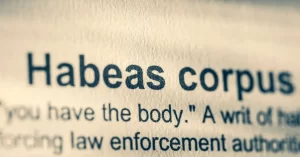Habeas Corpus in India is a legal safeguard rooted in the principle that no one should be detained unlawfully. This article provides a comprehensive understanding of Habeas Corpus, tracing its historical evolution, its essential applications, and its continued relevance in the Indian legal landscape.
Understanding Habeas Corpus
Habeas Corpus Explained
Habeas Corpus, a Latin term meaning “you shall have the body,” is a legal recourse that empowers individuals to challenge their detention or imprisonment. In essence, it serves as a shield against arbitrary or unlawful confinement.
Historical Origins of Habeas Corpus in India
The concept of Habeas Corpus can be traced back to England, where it was first established in the 17th century. India inherited this legal principle during British colonial rule, and it remains a vital part of the Indian legal system.
Key Elements of Habeas Corpus
- Petitioner: The individual or a representative filing the petition.
- Detainee: The person whose detention is in question.
- Custodian: The authority or entity responsible for the detention.
- Writ of Habeas Corpus: The legal order demanding the detainee’s presence in court.
- Due Process: Ensuring fair and just legal proceedings.
Habeas Corpus in India: Applications and Significance
1. Protecting Against Unlawful Arrest
Habeas Corpus serves as a formidable tool to safeguard individuals against arbitrary arrests and detentions. It requires authorities to justify the legality of detention before a court of law.
2. Ensuring Fair Trials
This legal remedy guarantees that detainees have the right to a fair trial and access to legal representation. It prevents individuals from languishing in custody without due process.
3. Countering Torture and Abuse
By allowing detainees to challenge their confinement, Habeas Corpus helps unearth cases of torture and abuse within the criminal justice system.
4. Preventing Extradition to Unsafe Jurisdictions
In cases involving extradition, individuals can use Habeas Corpus to contest their transfer to countries where their safety may be compromised.
Habeas Corpus in Modern India
1. A Fundamental Right
Habeas Corpus is not just a legal provision; it’s a fundamental right guaranteed under the Indian Constitution. Article 21 enshrines the right to life and personal liberty, providing a robust basis for Habeas Corpus applications.
2. Applicability to All Detainees
Habeas Corpus applies to all, regardless of citizenship. It ensures that no one, Indian or foreigner, can be detained unlawfully.
3. Digital Age Challenges
In an era of digital surveillance and evolving technology, Habeas Corpus has been invoked to address concerns related to privacy and cyber-detention.
4. National Security and Habeas Corpus
The balance between national security and individual rights occasionally leads to debates about the suspension of Habeas Corpus during emergencies.



